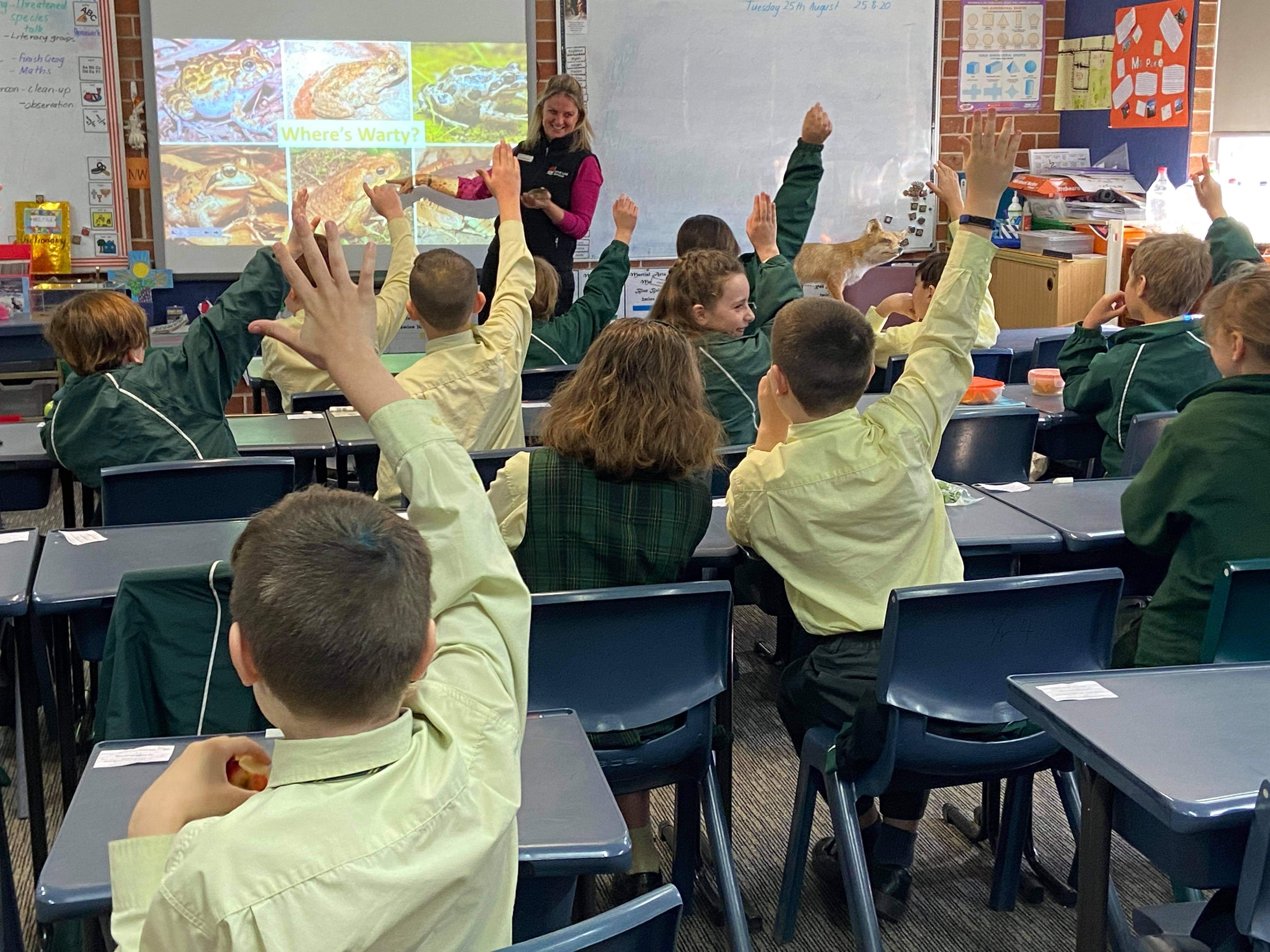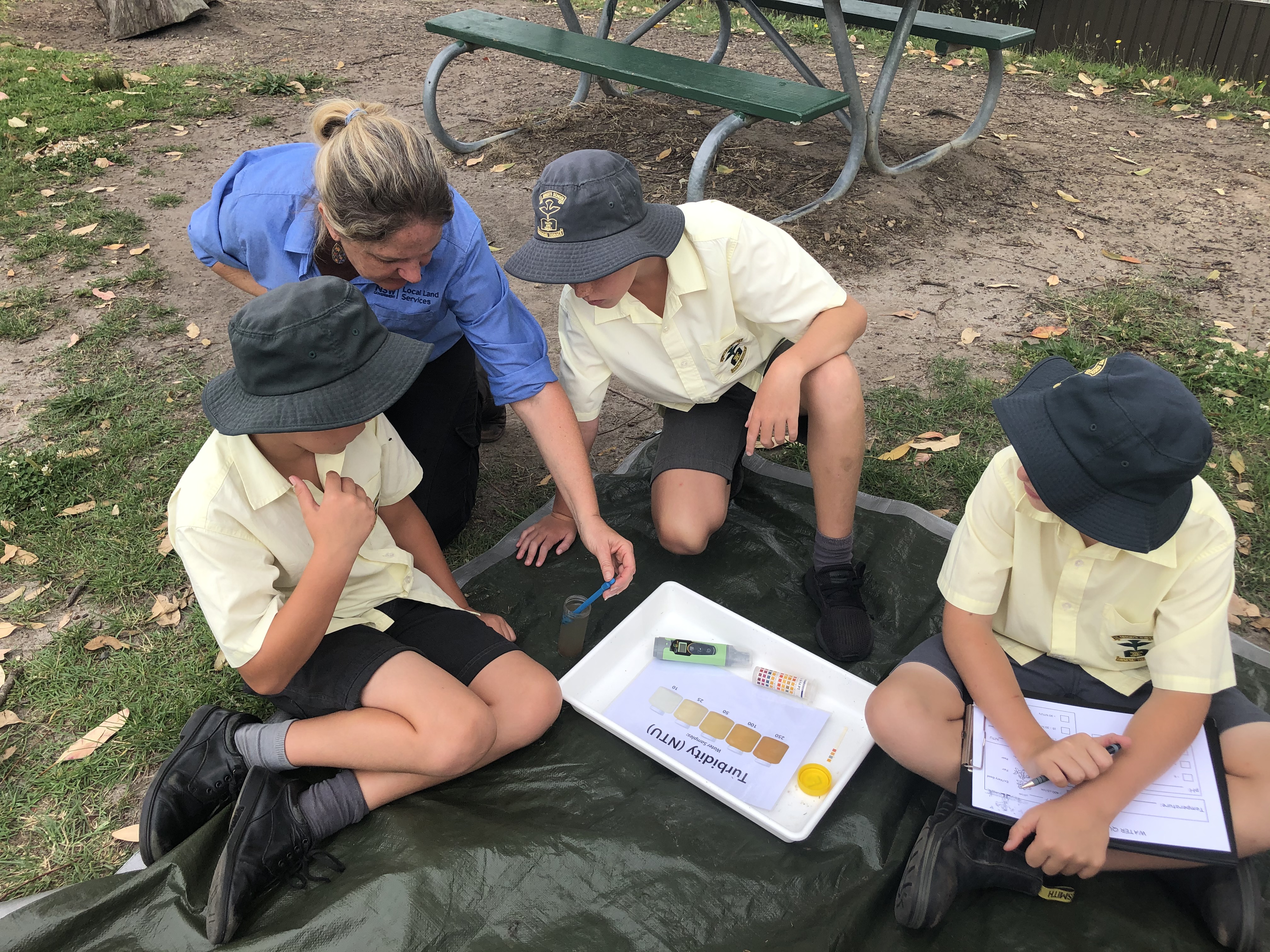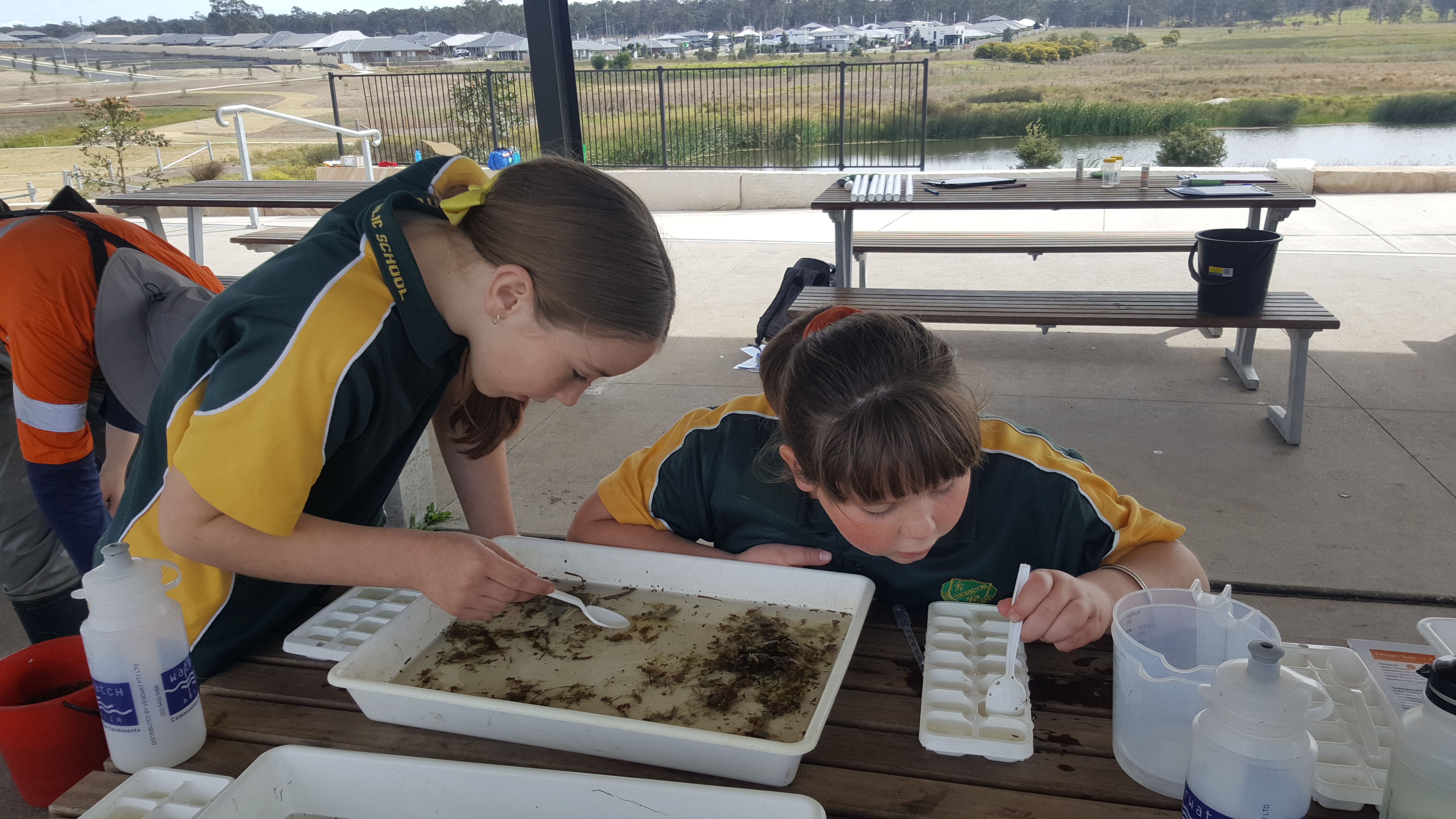Schools Engagement Program
Our future land managers are extremely important to Local Land Services. Through our school engagement program, we are growing our school students to become land management champions.
Inspire your students to become change makers! Our hands on activities focus on localised issues and solutions, providing your students with the confidence and knowledge to make a difference in their community.

Activities are suitable for both primary and high school students and are tailored accordingly.
“Our students have learnt critical skills about working together to care for our natural environment and preserve our natural resources. Thanks to this program, our students are beginning a lifelong journey towards being biodiversity warriors.” - Kristen Jones, teacher, St Brigid’s Primary School Raymond Terrace
Check out our school’s program video to find out more.
To get involved or for more information about any of the activities below, please email Jane Lloyd-Jones, School Engagement Officer jane.lloyd-jones@lls.nsw.gov.au
Themes
Our school programs are based around the following themes.
Water quality and catchment health
By participating in hands on, interactive activities, your students will discover the importance of protecting water quality and catchment health for locally threatened species such as the Hunter River turtle and the platypus.
Activities
- A Catchment Story interactive presentation. Content is localised and based on the waterway close to your school.
- Water bug survey. Students dip net for water bugs from the local waterway and identify and count the bugs found. The number and type of bugs found provides an indication of the health of the waterway.
- Water quality testing. Students collect a water sample from their local waterways and test for basic parameters such as pH, turbidity, salinity and available phosphate. Linkages are made between water pollutants, their potential sources and their impacts on waterway health.
- Catch the Catchment Criminals. Students test and analyse a number of different water samples from a fictitious catchment and match the samples with catchment ‘polluters’.
- Riparian vegetation assessment and guided meditation. Students participate in a guided meditation based around a riparian zone, followed by a lesson on the importance of riparian zones for water quality and biodiversity.
- Race down the river giant game (suitable for max 8 students per game). A large 6m x 4m sized game based on snakes and ladders with simple ‘good’ and ‘bad’ actions we can take to protect river water quality.
- Dung beetles and their role in protecting water quality.


Resources
- Waterbugs across the catchment poster. Across the catchment the water quality can be Good, Fair and Poor. Different water bugs live in these conditions and are represented in this illustration.
- Riparian Habitat worksheet includes some fun activities to help students learn about riparian habitats.
- The Riparian Zone Guided Meditation Lesson Plan combines a ‘sense of place’ and mindfulness helps students appreciate the importance of these special areas. The meditation is followed by a lesson on the importance of riparian zones for water quality and biodiversity.
- Dung Beetles are nature’s animal waste processors. This worksheet includes how to identify these important little waste machines
- Frogs of the Hunter includes information on how to identify frogs, their calls and how to attract frogs to your garden.
- Platypus class activities includes some fun facts about the platypus, ideas for in class activities and student worksheets.
- Rakali class activities includes some fun facts about rakali, ideas for in class activities and student worksheets.
Is your school located near the Hunter River?
Join schools along the length of the Hunter River for a citizen-science project during March and September 2024.The Hunter River Health Check is running for the second time in 2024 and has the following objectives:
- Identify and monitor health markers of the Hunter River.
- Understand challenges and solutions to the Hunter River’s ecosystem.
- Recognise the risk facing threatened flora and fauna connected to the Hunter River.
- Appreciate and acknowledge the connections Indigenous people have with the Hunter River.
- Investigate the social andeconomic importance of the Hunter River to our communities.
Check out this video of the 2023 HRHC to see citizen scientists in action.
- The Health Check is being held from 11–22 March and 16–27 September (pick a day that suits your school).
- You can choose to participate at the river or in the classroom (collect a water sample & bring to school).
- All testing equipment, resources & support provided.
Participating schools will have the opportunity to send their environmental student leaders to our ‘Species Survival – More Than Just Sustainability’ workshops during Science Week 2024. Please fill out an Expression of Interest if your school would like to be involved or contact our Schools Engagement Officer, Jane Lloyd-Jones, jane.lloyd-jones@lls.nsw.gov.au.
Pest animals
Your students will find out about the vertebrate pests in their local area which are impacting on native animals, the environment and agriculture. Pest animals discussed include cats, foxes, rabbits, wild dogs, feral deer and feral pigs.
Activities
- Interactive in class presentation on pest animal species found in the local area, including a ‘Call to Action’ for students
- Whose Poo? in class activity. Students identify native and pest animal scats in resin.
Resources
- Who’s living in my school? teaching resource. Students will discover how to identify, monitor and record the presence of pest and native animals in their school grounds. They will then develop a Call to Action plan to encourage native wildlife and manage pests.
- The Fast and the Furriest game. This fast-moving outdoor game helps students learn about the fight for survival many threatened species experience due to the impacts of pest animals and humans.
Cultural burning
Cultural burning is an ancient indigenous practice used to heal the land, returning the country back to health. Cultural burning can also be used today by land managers and farmers to assist them to manage their land and help protect the environment and property from wildfire.
Cultural burns are cool is an educational resource developed by Hunter Local Land Services, consisting of a story, facts and script for a play. The play provides an immersive experience for students, enabling them to obtain an appreciation of how and why Cultural burns can benefit, improve and maintain healthy landscapes for our community. Email jane.lloyd-jones@lls.nsw.gov.au to receive a hard copy of the resource.
Watch St Brigid’s Primary school students perform the play Caring for Country with Fire (youtube.com)
Join the Catchment Crusaders
Hunter Local Land Services has teamed up with international award-winning performer Joel Howlett from JD's World of Magic to deliver a fun, interactive and educational experience that students will never forget! The Catchment Crusader magic show will keep students fully engaged while they find out about catchments, riparian zones and simple ways we can all protect our creeks and rivers.
The experience is appropriate for Kinder - Year 6 and there is no minimum or maximum audience size. The running time of the production is 40 minutes and the only requirement is that we present the show indoors such as in a school hall, classroom or library space.


The show is available for free to local schools, however we only have limited spaces available to offer. If you are interested in the program coming to your school in 2024, please email Jane Lloyd-Jones, School Engagement Officer by email jane.lloyd-jones@lls.nsw.gov.au
Here’s what some teachers are saying about it….
"Wow! What a show Joel put on! He kept the students engaged in the content with his magic tricks, the adults engaged with his jokes, and also covered important things about keeping our environment clean! His 'catchment' talk was brilliant, a fantastic way to explain what a catchment is." Gresford Public School
"Our students and staff thoroughly enjoyed the magic show - there were some very powerful catchment protection messages in there for our students to think about" Dungog Public School
Sustainability Days
We can enhance the experience for your students by providing a range of activities with a sustainability focus, either at a local site (preferable) or at school. Depending on the location and availability, students may participate in water testing, a water bug survey, vegetation assessment, animal habitats, a catchment relay and more!
Other organisations such as Hunter Water, the Local Council, Landcare or Birdlife may be invited to attend and provide activity sessions. The School Engagement Officer can assist to determine a suitable site for your school.
EnviroStories
Create a legacy within your community! Following on from one of our presentations or activities, your students may have the opportunity to be involved in writing and illustrating their own story based on what they have learnt. Stories are published, posted online and copies are provided for the school library and all students.

See some examples of stories written by local Hunter students.
Adventures at your place
Discover the wonders of soil, spot backyard birds, identify wild pollinators and make a lizard lounge! These are just some of the activities which enable kids to discover their piece of the landscape puzzle in our Adventures at Your place activity series. The activities encourage kids to get outside and explore their own backyard or local bushland/waterway and are also suitable for the school playground or in class.
Marine debris removal (high school students only)
Take part in Clean4Shore’s award-winning marine debris reduction program and contribute to the Australian Marine Debris Initiative citizen-science project. Students will enjoy the thrill of getting muddy and the satisfaction of filling up a barge full of rubbish.
Students and trip leaders take to the mangroves by boat, collecting rubbish that has come to shore with the tide, or illegally dumped. The trip is a great opportunity for participants to see parts of the Hunter that are sometimes hidden, inaccessible by road.
Complies with all NSW Government and Department of Education WHS requirements. All personal protective equipment (PPE) provided, including wetsuits, booties, hi-vis shirts, gloves, and life jackets.
Our Partners
Hunter Region Landcare Network
